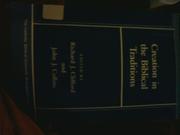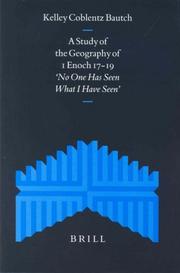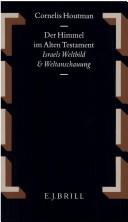| Listing 1 - 10 of 18 | << page >> |
Sort by
|
Book
ISBN: 0830891641 9780830891641 9780830852918 0830852913 Year: 2018 Publisher: Downers Grove, Illinois
Abstract | Keywords | Export | Availability | Bookmark
 Loading...
Loading...Choose an application
- Reference Manager
- EndNote
- RefWorks (Direct export to RefWorks)
Biblical cosmology. --- Cosmology. --- Astronomy --- Deism --- Metaphysics --- Cosmology, Biblical --- Cosmology --- Creation

ISBN: 091517023X 9780915170234 Year: 1992 Volume: 24 Publisher: Washington (D.C.): Catholic Biblical Association of America
Abstract | Keywords | Export | Availability | Bookmark
 Loading...
Loading...Choose an application
- Reference Manager
- EndNote
- RefWorks (Direct export to RefWorks)
Cosmology, Biblical --- Creation --- Biblical teaching --- 231.513 --- 222.2 --- -Biblical cosmogony --- Cosmogony --- Natural theology --- Teleology --- Beginning --- Biblical cosmology --- Creation windows --- Creationism --- Evolution --- Cosmology --- Schepping van de materiële wereld. Mosaische cosmogenese --- Genesis --- -Schepping van de materiële wereld. Mosaische cosmogenese --- 231.513 Schepping van de materiële wereld. Mosaische cosmogenese --- -Cosmogony --- Biblical cosmogony --- -Cosmology, Biblical --- Creation - Biblical teaching

ISBN: 2711609669 9782711609666 Year: 1988 Volume: 24 Publisher: Paris Vrin
Abstract | Keywords | Export | Availability | Bookmark
 Loading...
Loading...Choose an application
- Reference Manager
- EndNote
- RefWorks (Direct export to RefWorks)
Religion and geography. --- Biblical cosmology. --- Religion et géographie --- Cosmologie biblique --- Religion and geography --- Biblical cosmology --- 91 <09> --- Geography and religion --- Geography --- Cosmology, Biblical --- Cosmology --- Creation --- Aardrijkskunde. Geografie--Geschiedenis van ... --- Religion et géographie --- Aardrijkskunde. Geografie--Geschiedenis van .. --- Aardrijkskunde. Geografie--Geschiedenis van . --- Aardrijkskunde. Geografie--Geschiedenis van
Book
ISBN: 9782889185269 2889185265 Year: 2015 Volume: 26 Publisher: Les Plans-sur-Bex Parole et silence
Abstract | Keywords | Export | Availability | Bookmark
 Loading...
Loading...Choose an application
- Reference Manager
- EndNote
- RefWorks (Direct export to RefWorks)
La beauté du monde, mais aussi le scandale du mal qui semble parfois le ronger, interpellent toute conscience humaine. La réflexion élaborée par Louis Bouyer (1913-2004) dans Cosmos. Le monde et la gloire de Dieu est riche d'enseignements et résonne comme une invitation à reconnaître dans la réalité matérielle une présence spirituelle porteuse de sens. Le texte, publié en 1982, est loin d'être obsolète et cette étude voudrait le rendre accessible pour aujourd'hui. Il ne s'agit pas, pour Louis Bouyer, de proposer d'emblée une «cosmologie chrétienne» à accepter ou à rejeter comme telle, mais de rejoindre les questions de chacun. Toute «cosmologie» se fonde dans une expérience personnelle et toute «vision du monde» déploie sa cohérence rationnelle au sein d'un langage relevant d'une commune humanité en quête de transcendance. Louis Bouyer a exploré comment cette expérience s'est exprimée dans la variété des cultures et est entrée dans l'histoire en dialogue avec la révélation judéo-chrétienne. Il a recherché les apports et les écueils des différentes représentations du cosmos jusqu'aux atouts et aux limites de notre culture scientifique et technique, qu'il tente d'interpréter en conciliant croire et savoir.
Creation --- Biblical cosmology --- Cosmology --- Fall of man --- Glory of God --- Man, Fall of --- Cosmology, Biblical --- Biblical cosmogony --- Christianity --- Bouyer, Louis, --- 2 BOUYER, LOUIS --- Sin --- Sin, Original --- Astronomy --- Deism --- Metaphysics --- Cosmogony --- Natural theology --- Teleology --- Beginning --- Creation windows --- Creationism --- Evolution --- 2 BOUYER, LOUIS Godsdienst. Theologie--BOUYER, LOUIS --- Godsdienst. Theologie--BOUYER, LOUIS --- Bouyer, Louis

ISSN: 13842161 ISBN: 9004131035 9786610467501 1423711092 1280467509 9047402251 9781423711094 9789047402251 9789004131033 Year: 2003 Volume: 81 Publisher: Leiden Brill
Abstract | Keywords | Export | Availability | Bookmark
 Loading...
Loading...Choose an application
- Reference Manager
- EndNote
- RefWorks (Direct export to RefWorks)
A Study of the Geography of 1 Enoch 17-19 examines the travels of the patriarch Enoch who is given a guided tour of extraordinary and at times terrifying places located throughout the cosmos. Coblentz Bautch clarifies the text of 1 Enoch 17-19 by explaining how the sites described relate to one another geographically and by reconstructing the mental map of the geography that lies behind the textual descriptions. Especially provocative is the consideration of sources from the ancient Near East, Hebrew Bible and the world of Hellenistic Judaism that may have informed the world view of 1 Enoch 17-19 and parallel traditions. Through this study an important facet of apocalypses is illumined: their portrayal of geography and sacred space.
229*209 --- 913.3 --- 229*209 I Henoch (Ethiopische Henoch) --- I Henoch (Ethiopische Henoch) --- Aardrijkskunde van Palestina --- Ethiopic book of Enoch XVII-XIX --- Geography. --- Geography --- Comparative studies --- Biblical cosmology. --- Cosmology, Ancient. --- Geography, Ancient. --- Ancient geography --- Ancient cosmology --- Cosmology, Biblical --- Cosmology --- Creation
Book
ISBN: 1575066548 9781575066547 157506216X 9781575062167 9781575062167 Year: 2011 Publisher: Winona Lake Eisenbrauns
Abstract | Keywords | Export | Availability | Bookmark
 Loading...
Loading...Choose an application
- Reference Manager
- EndNote
- RefWorks (Direct export to RefWorks)
The ancient Near Eastern mode of thought is not at all intuitive to us moderns, but our understanding of ancient perspectives can only approach accuracy when we begin to penetrate ancient texts on their own terms rather than imposing our own world view. In this task, we are aided by the ever-growing corpus of literature that is being recovered and analyzed.After an introduction that presents some of the history of comparative studies and how it has been applied to the study of ancient texts in general and cosmology in particular, Walton focuses in the first half of this book on the ancient Near Eastern texts that inform our understanding about ancient ways of thinking about cosmology. Of primary interest are the texts that can help us discern the parameters of ancient perspectives on cosmic ontology—that is, how the writers perceived origins. Texts from across the ancient Near East are presented, including primarily Egyptian, Sumerian, and Akkadian texts, but occasionally also Ugaritic and Hittite, as appropriate. Walton’s intention, first of all, is to understand the texts but also to demonstrate that a functional ontology pervaded the cognitive environment of the ancient Near East. This functional ontology involves more than just the idea that ordering the cosmos was the focus of the cosmological texts. He posits that, in the ancient world, bringing about order and functionality was the very essence of creative activity. He also pays close attention to the ancient ideology of temples to show the close connection between temples and the functioning cosmos.The second half of the book is devoted to a fresh analysis of Genesis 1:1–2:4. Walton offers studies of significant Hebrew terms and seeks to show that the Israelite texts evidence a functional ontology and a cosmology that is constructed with temple ideology in mind, as in the rest of the ancient Near East. He contends that Genesis 1 never was an account of material origins but that, as in the rest of the ancient world, the focus of “creation texts” was to order the cosmos by initiating functions for the components of the cosmos. He further contends that the cosmology of Genesis 1 is founded on the premise that the cosmos should be understood in temple terms. All of this is intended to demonstrate that, when we read Genesis 1 as the ancient document it is, rather than trying to read it in light of our own world view, the text comes to life in ways that help recover the energy it had in its original context. At the same time, it provides a new perspective on Genesis 1 in relation to what have long been controversial issues. Far from being a borrowed text, Genesis 1 offers a unique theology, even while it speaks from the platform of its contemporaneous cognitive environment.
Biblical cosmology. --- Cosmogony. --- Cosmology --- Cosmology, Biblical --- Creation --- Bible. --- Gen 1 (Book of the Old Testament) --- Genesis 1 (Book of the Old Testament) --- Criticism, interpretation, etc. --- Biblical cosmology --- Cosmogony --- 222.2 --- 291.217 --- 291.217 Cosmogonie. Strijd van de goden onder elkaar en tegen de mens --- Cosmogonie. Strijd van de goden onder elkaar en tegen de mens --- Genesis --- Weltbild. --- Exegese. --- Genesis 1. --- Alter Orient.
Book
ISBN: 9780199558568 9780199596744 0199596743 0199558566 Year: 2010 Publisher: Oxford Oxford University Press
Abstract | Keywords | Export | Availability | Bookmark
 Loading...
Loading...Choose an application
- Reference Manager
- EndNote
- RefWorks (Direct export to RefWorks)
227.1*2 --- 227.08 --- Biblical cosmology. --- Cosmology, Biblical --- Cosmology --- Creation --- 227.08 Paulinische theologie --- Paulinische theologie --- 227.1*2 Brieven van Paulus aan de Corinthiërs --- Brieven van Paulus aan de Corinthiërs --- Bible. --- Epistles of Paul --- Paul, Epistles of --- Paul Sŏsin --- Pauline epistles --- Risālat al-Qiddīs Būlus al-rasūl al-thāniyah ilá Tīmūthīʼūs --- Criticism, interpretation, etc. --- Biblical cosmology
Book
ISBN: 9780567031433 0567031438 Year: 2008 Volume: 355 Publisher: London Clark
Abstract | Keywords | Export | Availability | Bookmark
 Loading...
Loading...Choose an application
- Reference Manager
- EndNote
- RefWorks (Direct export to RefWorks)
Biblical cosmology --- Cosmology, Ancient --- Bible --- Theology --- 225.08 --- Ancient cosmology --- Cosmology, Biblical --- Cosmology --- Creation --- 225.08 Nieuw Testament: bijbelse theologie--(algemeen) --- Nieuw Testament: bijbelse theologie--(algemeen) --- Bible. --- Ba-yon Tipan --- Bagong Tipan --- Jaji ma Hungi --- Kainē Diathēkē --- New Testament --- Nouveau Testament --- Novo Testamento --- Novum Testamentum --- Novyĭ Zavet --- Novyĭ Zavi︠e︡t Gospoda nashego Īisusa Khrista --- Novyĭ Zavit --- Nuevo Testamento --- Nuovo Testamento --- Nye Testamente --- Perjanjian Baru --- Dhamma sacʻ kyamʻʺ --- Injīl --- Theology.

ISBN: 9004096906 9789004096905 9789004497474 9004497471 Year: 1993 Volume: 30 Publisher: Leiden Brill
Abstract | Keywords | Export | Availability | Bookmark
 Loading...
Loading...Choose an application
- Reference Manager
- EndNote
- RefWorks (Direct export to RefWorks)
How did Ancient Israel think of heaven? What place did it have in its view of the world? The Old Testament attests to a strikingly wide variety of concepts of heaven, and simultaneously to a very close association between heaven and earth. This study pays considerable attention to these topics and to the theme of heaven as God's realm and residence. These are some of the conclusions drawn: - for Ancient Israel, heaven and earth, (the principal components of the world) constituted a dynamic bipolarity, which was connected with mankind at one pole and with God at the other; - the Old Testament has no world-concept ("Weltbild"). It does not give a unanimous answer to the questions concerning the how of the coming into existence of the cosmos and the how of its structure and order. It does, however, imply a world-view ("Weltanschauung"), i.e. it answers the question: To whom does the world owe its birth and existence? This study offers a careful discussion of the Old Testament terms and concepts relating to heaven, and the use of the word-pair: heaven and earth. By distinguishing between 'world-concept' and 'world-view' a fruitful contribution is made to the clarification and understanding of the Old Testament concepts concerning the cosmos.
Bible OT --- Bible--Cosmologie --- Bible--Cosmology --- Biblical cosmology --- Bijbel--Kosmologie --- Bijbelse kosmologie --- Cosmologie biblique --- Cosmology [Biblical ] --- Kosmologie [Bijbelse ] --- Biblical cosmology. --- Creation --- Biblical teaching. --- Bible. --- Criticism, interpretation, etc. --- 113/119 --- 236.6 --- 221.08*01 --- -Biblical cosmogony --- Cosmogony --- Natural theology --- Teleology --- Beginning --- Creation windows --- Creationism --- Evolution --- Cosmology, Biblical --- Cosmology --- Kosmologie. Natuurfilosofie. Filosofie van de natuur --- Hemel. Paradijs. Uitverkorenen. Triomferende Kerk --- Theologie van het Oude Testament: God--(Godsleer) --- Biblical teaching --- Cosmologie biblique. --- Création --- Hemel. --- Wereldbeeld. --- Oude Testament. --- Kosmologie. --- Weltbild. --- Erde. --- Himmel. --- Ciel --- Weltanschauung --- Enseignement biblique. --- Aspect religieux --- Judaïsme. --- Altes Testament. --- Bible --- Critique, interprétation, etc. --- -Kosmologie. Natuurfilosofie. Filosofie van de natuur --- 221.08*01 Theologie van het Oude Testament: God--(Godsleer) --- 236.6 Hemel. Paradijs. Uitverkorenen. Triomferende Kerk --- 113/119 Kosmologie. Natuurfilosofie. Filosofie van de natuur --- -Cosmology, Biblical --- Biblical cosmogony --- Antico Testamento --- Hebrew Bible --- Hebrew Scriptures --- Kitve-ḳodesh --- Miḳra --- Old Testament --- Palaia Diathēkē --- Pentateuch, Prophets, and Hagiographa --- Sean-Tiomna --- Stary Testament --- Tanakh --- Tawrāt --- Torah, Neviʼim, Ketuvim --- Torah, Neviʼim u-Khetuvim --- Velho Testamento --- Bible. Old Testament --- Criticism, interpretation, etc --- Creation - Biblical teaching. --- Bible. A.T. --- Enseignement biblique --- Judaïsme --- Création --- Critique, interprétation, etc. --- Judaïsme
Book
ISBN: 3161475402 9783161475405 Year: 2001 Volume: 32 Publisher: Tübingen Mohr Siebeck
Abstract | Keywords | Export | Availability | Bookmark
 Loading...
Loading...Choose an application
- Reference Manager
- EndNote
- RefWorks (Direct export to RefWorks)
Bible--Cosmologie --- Bible--Cosmology --- Biblical cosmology --- Bijbel--Kosmologie --- Bijbelse kosmologie --- Cosmologie biblique --- Cosmologie de l'Antiquité --- Cosmologie judaïque --- Cosmology [Ancient ] --- Cosmology [Biblical ] --- Cossmology [Jewish ] --- Jewish cosmology --- Joodse kosmologie --- Kosmologie [Bijbelse ] --- Kosmologie [Joodse ] --- Kosmologie van de Oudheid --- Bible --- Antiquities. --- 221.08*8 --- Theologie van het Oude Testament: relatie met de klassieke oudheid --- 221.08*8 Theologie van het Oude Testament: relatie met de klassieke oudheid --- Antiquities --- Bible. --- Antico Testamento --- Hebrew Bible --- Hebrew Scriptures --- Kitve-ḳodesh --- Miḳra --- Old Testament --- Palaia Diathēkē --- Pentateuch, Prophets, and Hagiographa --- Sean-Tiomna --- Stary Testament --- Tanakh --- Tawrāt --- Torah, Neviʼim, Ketuvim --- Torah, Neviʼim u-Khetuvim --- Velho Testamento --- Criticism, interpretation, etc. --- Bible - Antiquities.
| Listing 1 - 10 of 18 | << page >> |
Sort by
|

 Search
Search Feedback
Feedback About UniCat
About UniCat  Help
Help News
News